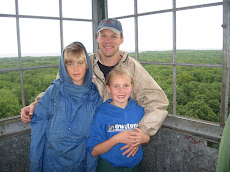Because I already use Facebook, RSS, podcasts, a blog, a wiki and video conferencing regularly, for these two weeks I have tried to learn more about things I haven't tried, such as Twitter and Delicious. I have read a bit about Twitter, but the MPR show was really the most helpful for me, as it allowed others to share their ideas of how they use Twitter in their lives. I was tempted to get a Twitter account and try some online "Twitter Credit" for my students, but I simply didn't take the time to do so. However, now that I see it is an assignment for this next week, I guess that is what I will be doing. ;-) I am curious how a Twitter Credit assignment will go over with my students. My 13-year-old son didn't really know about Twitter, and the MPR show stated that Twitterers tend to be on average older than FBers--31 years vs 27 or something like that. Of course, since every kid I know on FB has lied about his age (my son included) it might be hard to gauge how old the FB audience is.
I have used my Delicious account to keep track of all the places we need to go regularly for this class. That has been helpful for me. I can also see using it in a way similar to Amy-posting online reading assignments there for my students to check out. However, I can also do the same thing by posting links on the wiki. Since multiple classes use the school's wiki (which I set up and manage) that really makes most sense for us. Fewer addresses for the kids to remember. Of course, they could add the wiki to their Delicious account . . . ugh, it is all starting to spiral together, isn't it?
Despite the fact that kids are supposedly more tech saavy than adults, I do not think my students know more about things like Delicious and wikis and blogs, etc than I do. Whenever I use some type of electronic tool, I always have to teach the kids how to use it first. They catch on very quickly of course, but I don't think we can assume they know everything just because they are kids. Now, this might be differet for high school kids, but for junior high kids, I think online experience is relatively limited for most.
Add this is a good segue into my next point: technology is all well and good, but if we don't teach kids how to use it properly, how to take advantage of what it has to offer, how to use it politely, then we are missing something important. I don't know if the topic of proper use is going to come up in this class, but it seems to me it should be part of the discussion. We will all leave here knowing how to use all sorts of online apps, but we if we haven't discussed ways to get kids to perform effective searches, think critically about what they find online and other user-related issues, then I think we will have missed something very important. I know the first part of this class has to be about building "fluency", but once some fluency is established, I think we need to start looking at the issues associated with technology.
I think, ultimately, this class needs to be about not only what is out there, but how it can serve us. I appreciated the last quarter or so of the Hendron book where he gave many different ways to apply these technologies in our classes. Through Classroom 2.0 I have hooked up with a teacher in New York who is also interested in doing some distance collaborations. I have had a lot of bad luck setting things up though video conferencing. It is simply difficult to coordinate different school's schedules, break, etc. Not to mention that we all get lazy and don't immediately return emails. Hopefully this will work out good for both of us. For me, my job next year will be very different. (My media specialist position has been cut due to budget cuts) so exactly what, how, where and when I will be teaching is still up in the air.
A final thought: Probably the best online tool I have used so far is blogging. Exactly how I can get kids blogging I am not sure. I will have to check with our tech guy and explore some possibilities. That is an area I want to explore yet in this class.
Wednesday, March 25, 2009
Subscribe to:
Post Comments (Atom)






No comments:
Post a Comment